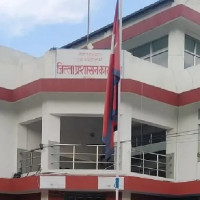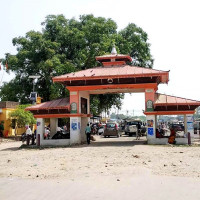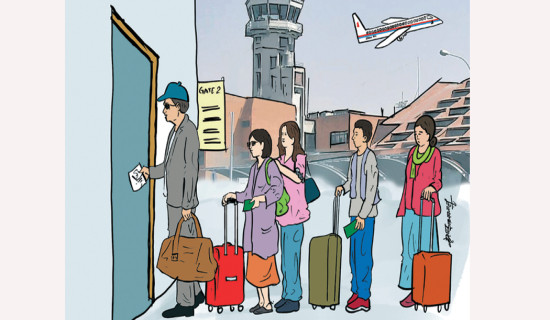- Thursday, 26 February 2026
Embossed number plates to be mandatory from mid-September
Kathmandu, Aug. 22: After nearly nine years of lull, the government is set to enforce the much-talked embossed number plate system, making it mandatory nationwide from September 17.
The Ministry of Physical Infrastructure and Transport (MoPIT) has confirmed that from the stated date, embossed number plates will be compulsory for all types of vehicles during registration, ownership transfer, and renewal at transport management offices under provincial governments.
The Department of Transport Management (DoTM), in a notice issued on Tuesday (August 19), reiterated the decision while announcing technical and regulatory preparations in collaboration with the Ministry of Home Affairs and the Traffic Police.
In line with this, the DoTM has finalised the Embossed Number Plate Installation Guidelines, 2081, and developed an implementation plan to streamline the process.
The government had first introduced the ambitious project in FY 2015/16 with the aim of phasing out conventional number plates (currently in practice). In May 2016, it awarded the contract to Decatur-Tiger IT, a Bangladesh–US joint venture, which was expected to install embossed plates on 2.5 million vehicles by 2021.
However, the project was mired in legal disputes, administrative delays, and allegations of irregularities. The use of English text over Nepali script on plates triggered nationwide protests, while questions over inflated pricing, poor quality standards, and blacklisting rumours of blacklisting against the contractor further fueled opposition.
Petitions were filed at both the Supreme Court and the Commission for the Investigation of Abuse of Authority. The Supreme Court, after nearly two-and-a-half years of hearings, ruled that using English script or text, similar to passports and driving licenses, did not contradict the Constitution. Following the clearance from the judiciary and anti-graft body, the government decided to resume implementation.
Under the contract, motorcycles must pay Rs. 2,500, three-wheelers Rs. 2,900, four-wheelers Rs. 3,200, and larger vehicles Rs. 3,600 for embossed plates, almost three times the cost of conventional plates. This has drawn sharp criticism from lawmakers, consumer groups, and transport entrepreneurs. However, officials defend the pricing, noting that the system offers advanced security features and costs far less than in many countries, where embossed plates can cost up to Rs. 10,000. According to DoTM’s Director General Rajeev Pokharel, embossed plates will digitise the country’s vehicle database, making it easier to track ownership, prevent tax evasion, and combat vehicle theft.
Nepal currently lacks a centralised database on the exact number and type of vehicles in operation in the country. The system is expected to generate real-time data on traffic volume, public transport demand, and road usage - critical for transport policy-making.
“With over 3,500 vehicles stolen annually, this technology will significantly curb illegal use and strengthen citizen safety,” said Pokharel. The plates will also allow vehicle owners to pay taxes online sitting at homes, eliminating long queues at tax offices.
RFID tracking system underway
The DoTM also announced plans to install Radio Frequency Identification Device (RFID) gates at 10 locations nationwide to monitor vehicle movement. Two gates are already operational in Nagdhunga and Nagarjun (Bhimdhunga and Dhading border point), while construction is underway in Pharping, near Dakchhinkali, and Pathlaiya.
The contractor has committed to constructing 100 RFID gates, supplying handheld tracking devices, and producing 2.5 million embossed plates.
Installation progress so far
Nepal has an estimated 6 million registered vehicles. Of the 800,000 embossed plates manufactured to date, about 700,000 have been handed over to the DoTM, which has already distributed 300,000 to provincial offices. Over 80,000 vehicles have been fitted with the new embossed number plates so far.
Regional commitments
Experts note that Nepal’s decision is also influenced by international obligations. Transport expert Ashish Gajurel said, “The South Asian Multilateral Transport Agreement between Nepal, India, and Bangladesh requires standardised plates that meet global recognition and technology-readability standards. Our current plates fall short of these requirements.”
With the countdown to enforcement now underway, vehicle owners will have no option but to switch to embossed number plates beginning mid-September, he said.
















